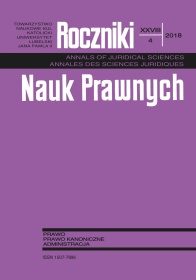Worker’s Employment Agreement – Polish Legal Regulations of the Interwar Period
Abstract
In independent Poland, the legal regulations for a new area of law, labor law, which has previously broken the fundamental principle of the freedom of contract, on which the contractual relationship of the employee’s work to the employer was based, were started from scratch. On March 16, 1928, the President of the Republic issued a regulation on the employment contract for workers specifying the mutual obligations of the employee and employer, based on a contract of employment under which the employee undertook to provide work for the employer for remuneration. The legislator allowed for the conclusion of a contract of employment in writing, verbal or other form customarily adopted in a given workplace. As it was indicated above, the employer was obliged to pay the appropriate contractual remuneration which the employer specified in the employment contract in return for the work provided.
Importantly, the Regulation included a number of regulations protecting the employee and thus levelling his position in relation to the employer. These include provisions regarding the protection of remuneration or obligation in the scope of determining by the employer the work regulations. However, the most important ones are those defining mutual obligations of the parties in the scope of terminating the employment relationship, the regulation protected the employee against immediate and groundless termination of employment.
References
Baszak Łukasz: Regulacje prawne umowy o pracę pracowników umysłowych w latach 1928-1939, Folia Iuridica Universitatis Wratislaviensis 5 (2016), s. 9-23.
Fenichel Zygmunt: Umowa o pracę w projekcie polskiego kodeksu cywilnego, Głos Prawa 1-2 (1930), s. 288-300.
Jaśkiewicz Wiktor: Pozaumowne stosunki pracy, Ruch Prawniczy i Ekonomiczny 1 (1958), s. 3-28.
Jończyk Jan: Prawo pracy, Warszawa: Wydawnictwo PWN 1984.
Kempner Stanisław: Prawo do pracy, Warszawa: Towarzystwo Wydawnicze 1919.
Krzyśków Barbara: Pojęcie ochrony pracy w prawie pracy, Bezpieczeństwo Pracy 6 (2006), s. 6-8.
Leser Zygmunt: Umowa o pracę, Lwów: Wydawnictwo Księgarni Narodowej 1935.
Lewy Marceli: Prawo przemysłowe i robotnicze, Warszawa: Wydawnictwo F. Hoesicka 1918.
Lityński Adam: [recenzja] Aneta Giedrewicz-Niewińska, Projekt kodeksu pracy z 1949 r., Wyd. Napoleon V, Oświęcim 2015, ss. 218, Roczniki Administracji i Prawa 16 (1) 2016, s. 355-358.
Łapiński Karol: Umowa o pracę na czas określony w polskim i unijnym prawie pracy, Warszawa: Wydawnictwo Wolters Kluwer 2011.
Organiściak Wojciech: Prawo pracy II Rzeczypospolitej. Szkic dla celów dydaktycznych, Z Dziejów Prawa 2 (2009), s. 233-257.
Płaza Stanisław: Historia prawa na tle porównawczym. Okres międzywojenny, Kraków: Wydawnictwo Uniwersytetu Jagiellońskiego 2001.
Rosmarin Stefan: Układ zbiorowy według kodeksu zobowiązań, a ustawy o zbiorowych stosunkach pracy, Głos Prawa 12 (1933), s. 703-713.
Stańczyk Elżbieta: Środowisko pracy w II Rzeczypospolitej, Przegląd Prawa i Administracji 77 (2008), s. 293-311.
Sterling Helena: Międzynarodowa organizacja pracy i jej działalność, Warszawa: Wydawnictwo Księgarnia Robotnicza 1928.
Wengierow Jerzy: Jeszcze o zależności pracownika w stosunku pracy, Przegląd Prawa Pracy 2 (1939), s. 2-13.
Wertheim Bronisław: Charakter prawny umowy o pracę chałupniczą, Głos Prawa 6 (1933), s. 713-723.
Zabiegliński Krzysztof, Łabaziewicz Zbigniew: Polskie prawo pracy w okresie międzywojennym (wybrane zagadnienia), Colloquium Wydziału Nauk Humanistycznych i Społecznych 1 (2009), s. 239-250.
Copyright (c) 2018 Roczniki Nauk Prawnych

This work is licensed under a Creative Commons Attribution-NonCommercial-NoDerivatives 4.0 International License.


